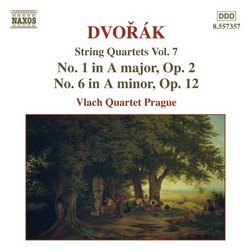| All Artists: Antonin Dvorak Title: Dvor�k: String Quartets, Vol. 7 Members Wishing: 0 Total Copies: 0 Label: Naxos Release Date: 2/22/2005 Genre: Classical Styles: Chamber Music, Historical Periods, Classical (c.1770-1830) Number of Discs: 1 SwapaCD Credits: 1 UPC: 747313235728 |
Search - Antonin Dvorak :: Dvor�k: String Quartets, Vol. 7
 | Antonin Dvorak Dvor�k: String Quartets, Vol. 7 Genre: Classical
|
Larger Image |
CD Details |
CD ReviewsTwo Early Dvor�k Quartets J Scott Morrison | Middlebury VT, USA | 03/01/2005 (4 out of 5 stars) "One notices that the 'New Vlach Quartet' is, these days, calling itself the 'Vlach Quartet.' Some confusion, one might say, because there was a 'Vlach Quartet' whose first violinist, Josef Vlach, was father of the first violinist in the 'New Vlach,' Jana Vlachová. This iteration is entirely new, but I guess they've been playing long enough now, and memories of the older quartet have perhaps faded enough, that they can now drop the 'New' from their name. Still, this quartet is not the equal of the older one. The 'old' Vlach Quartet had a warmer, richer sound--and I don't just think that's because they were recorded in analog sound. It seems clear to me that Mlle Vlachová has a wirier sound than her father, and that effects these violin-dominated works a good bit.
The quartets themselves are worth getting to know. Although only 21 when he wrote the First Quartet, Op. 2, Dvorák already showed signs of his easily recognizable style and this one has much to recommend it. Like all the great Romantic Era quartet writers, Dvorák had an innate sense of melodic construction; he somehow could write themes that sounded like tunes, not motifs, and the Schumannian/Brahmsian harmonic underpinning makes them all the more hummable and memorable. And that's true from the very beginning. The highlight of this first quartet is the second movement, Andante affectuoso ed appassionato, largely because it is an 8-minute elaboration of one of Dvorák's patented long-limbed, folk-tinged melancholy tunes. Scrumptious. The following Allegro scherzando sounds even more Brahmsian with its irregular phrase lengths and harmonic twists; it has a neat little trio in F sharp minor. The finale has a vigorous theme that seems to invite contrapuntal treatment that never quite arrives; still, it is lively and a fitting ending to this nice first quartet. Written eleven years later (1873) and more assured, the Sixth Quartet, Op. 12, begins with a first theme with engaging off-beat accents that sounds at first like it is just going to be an accompanimental figure (and at times it is) but it is treated to terrific sonata allegro development, along with its sweet subsidiary theme. Bohemian folk dance underlies the second movement, Poco allegro, and Dvorák is beginning to sound more like the Dvorák we know and love. The heart of the quartet is its third movement, Poco adagio, with its yearning melodies treated with almost Schubertian tenderness. The finale, which makes use of earlier snippets of melody, is highly contrapuntal at the same time that it dances; that dotted rhythm from the first movement makes repeated appearances before the whole thing comes to a jolly finish. These quartets are not often heard, outside Bohemia at least, and yet they are worthy of inclusion in the occasional quartet program. The Vlach's playing is a little rough and ready at times, but they clearly have this music in their veins, as they do all the Dvorák quartets which they have been recording over the last few years. TT=66:53 Scott Morrison" |

 Track Listings (8) - Disc #1
Track Listings (8) - Disc #1